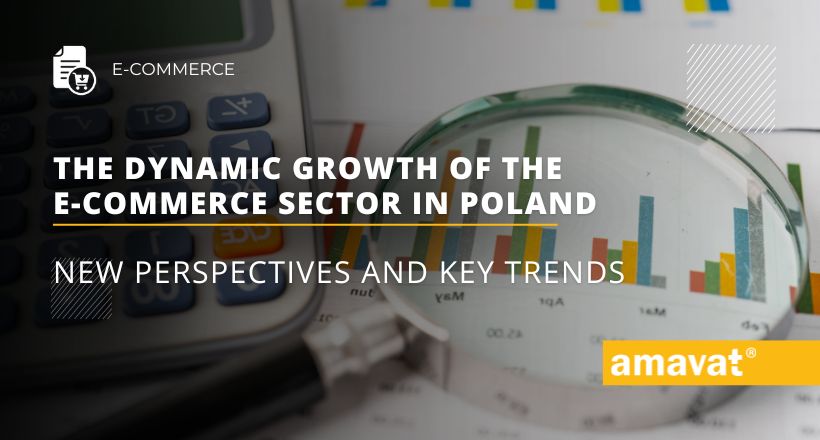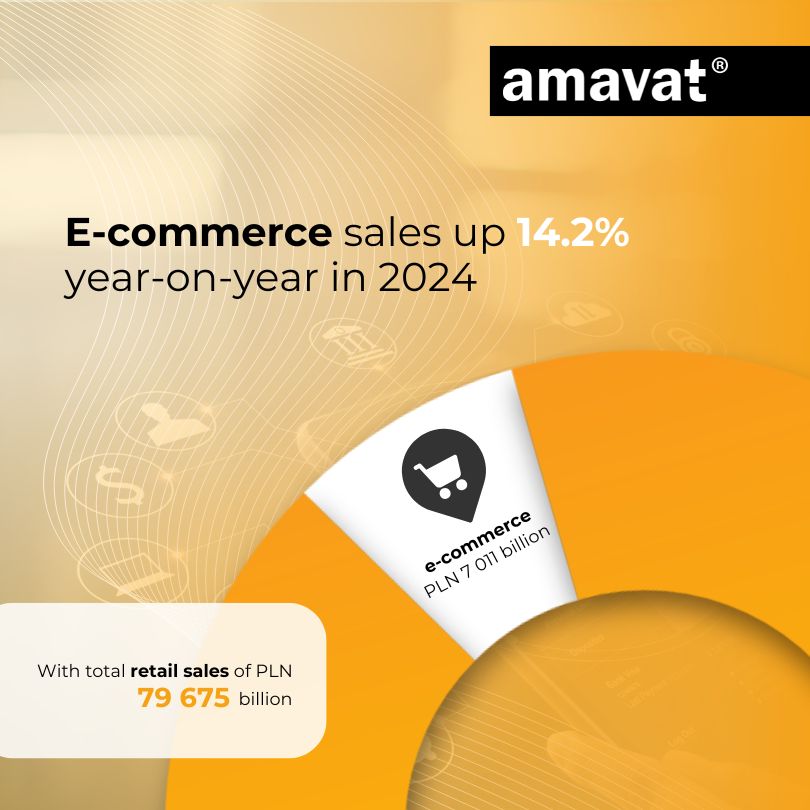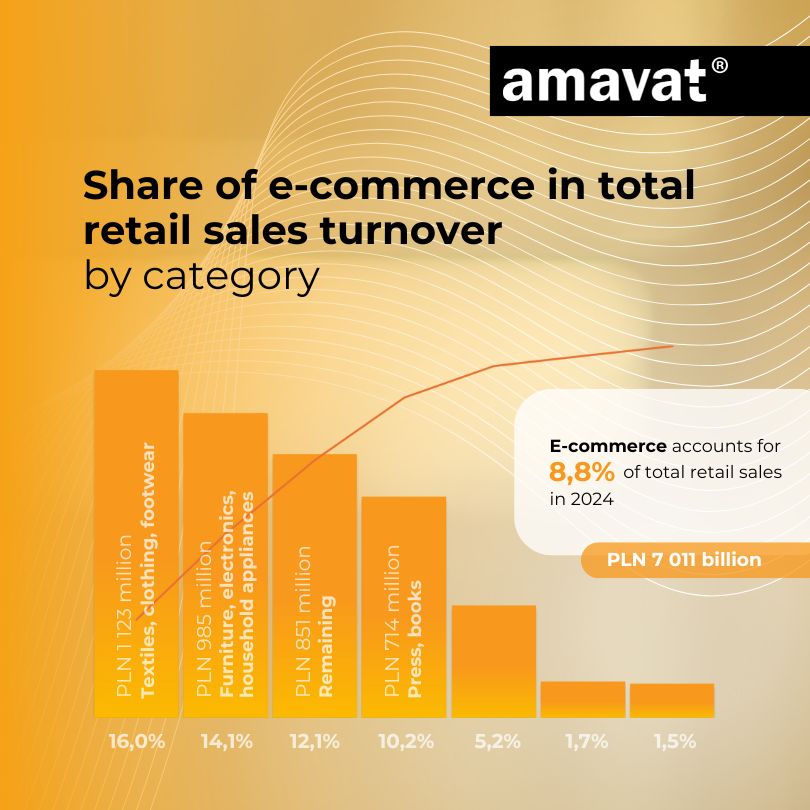The dynamic growth of the e-commerce sector in Poland: New perspectives and key trends
The e-commerce market in Poland is experiencing dynamic growth and transformation, becoming a key segment of retail trade. The primary driver accelerating the digital transformation of businesses was the pandemic and the associated lockdowns, which prompted consumers to increasingly shop online. In 2024, e-commerce constitutes 8.8% of total retail sales, amounting to PLN 701.1 billion out of a total retail sales value of PLN 79,675 billion. This marks a significant 14.2% increase compared to the previous year. This article analyzes the current state of the e-commerce market in Poland, the share of various product categories, key trends, and future forecasts.
Retail trade and the e-commerce market
The retail market in Poland is highly diversified and extensive, with e-commerce gaining increasing importance. The pandemic significantly accelerated the growth of online sales, and the number of consumers preferring online shopping has risen sharply.
In 2024, the value of retail sales amounts to PLN 79,675 billion, with PLN 701.1 billion attributable to e-commerce. This represents a substantial increase compared to previous years, indicating the growing popularity of online shopping among Poles. E-commerce in Poland not only increases its market share but also changes the way consumers make purchases by introducing new technologies and business models.
Currently, approximately 150,000 Polish companies actively participate in online sales, utilizing both their own online stores and marketplace platforms. It is worth noting that compared to Western European countries, Poland still has a relatively small number of online stores, which however opens up space for their further development and expansion. Amazon’s entry into the Polish market is a significant impetus for the development of the e-commerce sector, creating an additional sales channel for small Polish businesses and expanding their reach. Amazon not only offers an effective sales mechanism but also provides logistical infrastructure, customer service, and marketing tools, facilitating companies’ reach to new customers and effective management of their online business.
Share of e-commerce in total turnover by category
Among online purchases, the largest percentage share in various product categories included:
- Textiles, clothing, and footwear: 16% (PLN 1.123 billion)
- Furniture, electronics, household appliances (RTV, AGD): 14.1% (PLN 0.985 billion)
- Press, books: 10.2% (PLN 714 million)
Forecast for the global e-commerce market
According to PwC forecasts, the Polish e-commerce market is expected to reach a gross value of approximately PLN 162 billion by 2026, representing an average annual growth of 12%. This growth is expected to be driven by several key factors, such as the increasing number of internet users, the development of mobile technologies, and growing consumer trust in online shopping. Additionally, global trends such as cross-border e-commerce and increasing personalization of shopping experiences will impact the further development of the Polish market.
Key trends for the e-commerce sector in 2024
In 2024, several key trends in the e-commerce market have the potential to significantly influence how consumers shop online and how companies manage their operations:
AI and Machine Learning: Artificial Intelligence (AI) and Machine Learning (ML) are increasingly being used for personalized offerings, logistics process optimization, and improving customer service. AI algorithms can analyze customer purchasing behaviors to offer personalized product recommendations, thereby increasing customer satisfaction and loyalty.
Cross-border: The development of cross-border e-commerce allows Polish companies to expand their operations into foreign markets. Through e-commerce platforms such as Amazon and eBay, Polish products can reach customers worldwide. This is also an opportunity for Polish consumers to more easily purchase products from abroad.
Personalization of Customer Experience: Creating personalized shopping experiences is becoming standard in e-commerce. With advanced data analytics and AI technologies, companies can better understand their customers’ needs and tailor offers to their individual preferences. Personalization includes not only product recommendations but also personalized promotions, marketing communications, and unique shopping experiences.
Omnichannel: In 2024, omnichannel, integrating various sales and customer communication channels, is gaining importance. E-commerce companies increasingly combine online sales with traditional brick-and-mortar stores, allowing customers to seamlessly switch between channels. Through an omnichannel strategy, customers can, for example, order products online and pick them up in-store, increasing shopping convenience and flexibility. Furthermore, unified integration of sales channels and customer service allows companies to better manage inventory, analyze sales data, and adjust offers in real-time.
Same-day Delivery: Increasing emphasis on fast delivery makes same-day delivery services increasingly common. E-commerce companies are investing in developing their own logistics networks and partnering with courier companies to ensure the fastest order fulfillment. Fast delivery has become a key element of competitiveness in the market.
Automated Returns Management: Implementing automated returns management systems aims to streamline the returns process and improve customer satisfaction. Through automation, companies can quickly and efficiently process returns, minimizing costs and time associated with handling this process. Customers gain confidence that returns will be processed smoothly, increasing their trust in online shopping.
Challenges facing the e-commerce market – benefit from amavat® assistance
Despite dynamic growth, the e-commerce market in Poland faces many challenges. Competition is increasing, and companies must constantly invest in new technologies to attract and retain customers. Issues related to logistics, returns management, and data security are just some of the issues that need to be addressed for the sector to continue to grow.
The growing competition in the e-commerce market forces companies to invest in innovation and improve customer service quality. To meet changing customer needs and expectations, continuous monitoring of the market and adjustment of business strategies are essential. Investments in new technologies, offer personalization, and logistics development are crucial to maintaining competitive advantage. Effective logistics management, including process optimization and distribution network development, is fundamental to ensuring fast and reliable delivery. Collaboration with courier companies and automation of returns further increase efficiency and customer satisfaction. Equally important is ensuring data security, including protecting personal data and securing online transactions. Investments in modern technologies and procedures, as well as compliance with data protection regulations, are priorities for building customer trust.
At amavat®, we place great emphasis on creating teams with extensive experience in the e-commerce industry. We have in-depth knowledge of growth processes and business expansion in this field and understand the current challenges faced by businesses. With our years of experience, we are able to effectively advise clients, offering solutions that deliver the expected results. Our priority is the continuous development of our clients, as their success is also our achievement.
Summary
The e-commerce market in Poland in 2024 demonstrates dynamic growth, with an increasing share in total retail sales. Key trends such as AI, personalization, fast delivery, and automated returns management will shape the future of e-commerce, enabling companies to better adapt to customer needs and enhance their competitiveness in the market. Despite challenges such as competition, logistics, and data security, the e-commerce market in Poland has a promising future driven by innovation and growing consumer trust in online shopping.







